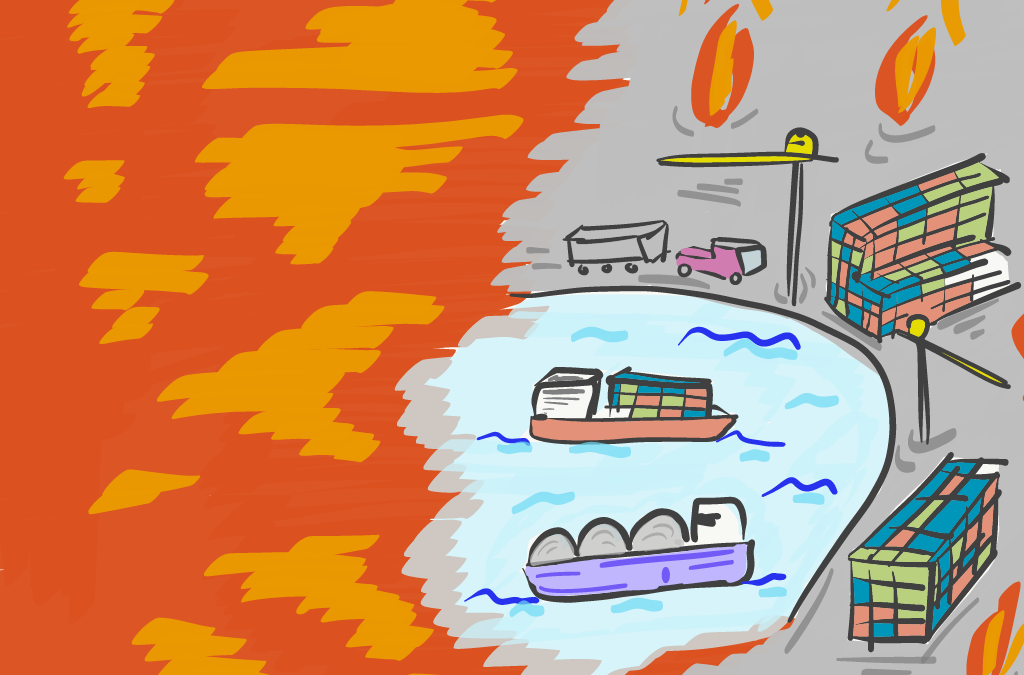We are experiencing the highest energy (power and gas) prices ever seen, supply chains are being disrupted worldwide, shortages of labour from drivers to waiters has been around for months. Can we consistently predict such dynamics? If not, how can we deal with such extreme but unexpected disruptions?
This summer the implementation of a universal salary in countries like Italy led to a massive shortage of workforce, with some employers complaining that workers refuse seasonal opportunities, some workers actually perceiving the universal income while also working on the black market, and some workers replying that this shows how bad the terms for such jobs are.
Ports worldwide have been under pressure, with significant delays in loading and unloading, and container shipping rates have skyrocketed. Multiple reasons have been brought to explain such imbalances, from reduced productivity caused by covid safety measures at ports to geographical imbalances (more than aggregate undersupply) of containers as a consequence of covid-related demand disruptions. Carriers and terminal operators are being investigated against possible abuses. Supply chain issues are not limited to logistics, though, with chip shortages affecting industrial output globally.
Energy prices have been skyrocketing to historically unseen levels, especially in Europe, with energy suppliers in the UK going bust, European governments stepping in to limit price increases for consumers, China forcing companies to reduce power consumption. All this on the back of geopolitical tensions and sanctions around the NordStream 2 pipeline from Russia to Germany. On top of that and technical supply disruptions, the uncertainties faced by fossil fuel producers with regards to the outlook for their industry may help exacerbate issues on the gas supply side, at least temporarily. Spain took a rather aggressive stance against energy companies, at least verbally, with President Sanchez claiming that certain energy company profits would be confiscated, potentially redefining the rules of the game and increasing uncertainty for investors.
Psychological Aspects
These are just some of the regional and global issues that we have been observing or facing. After extraordinary measures to contain the pandemic, we have been experiencing extraordinary economic imbalances. Such things can stimulate the discussion on whether government intervention leads to more imbalances that are followed by more government intervention, in a downward spiral; or whether they prove that greed, left uncontrolled, can only have disastrous and unfair consequences for those in a weaker position. Focusing on decisions psychology instead: how should entrepreneurs, managers and investors deal with extreme imbalances, national as well as international governmental and regulatory actions and their potential for medium- and long-term imbalances? Due to the almost infinite complexity of the economic system, it is extremely difficult, rather nearly impossible, for most at least, to predict sufficiently in advance and with sufficient certainty the majority of such imbalances. Media coverage raises awareness of these issues generally once they have already happened, which can lead to underestimation of such risks as long as there is no media coverage, and overestimation of their duration once media coverage is very strong, through mechanisms such as the availability bias.
With regards to management or investment decisions, such dynamics highlight the importance of maintaining an open mind, using psychological tools that enhance the number and range of possible outcomes we can imagine, and controlling biases such as overconfidence, especially with regards to the chain of consequences of one’s decisions.
Dislocations in the distribution of containers, low gas storage levels, economic rebound, universal income programs: these are some of the main factors recognised today as the causes of the current imbalances. None of these were completely unknown to the businesses most vulnerable to supply and demand imbalances today – why could all this still happen? Apart from informational noise, one answer is that it is clearly easier said than done, in part because knowledge alone is not enough to make good decisions and manage risks. Once we recognise an issue, we still need to act and do something about it, which can be complex and time-consuming in certain corporate and political setups due to structural issues and internal processes, in addition to some naturalinertiawe may be subject to as individuals – I am thinking for example of the bystander effect as well as loss aversion. We also need to manage our own psychology, our own risk attitude, understand our biases with regards to risk estimation, confidence and our understanding of the world. The “soft” skill of recognising our and other agents’ limitations is just as important as, and very important for, “hard” skills such as collecting data, building models, optimising processes or portfolios. This is true at personal, corporate, and government level, with obvious differences in the potential consequences that each can have on society. Each of these players has to balance the reaction to damaging events (backward-looking) with the management of invisible risks that have not yet materialised (forward-looking) and has different incentives and constraints in order to do so – not everyone has an incentive to avoid potential risks. While black swan events would not be such if we could predict them systematically, would an increase in creativity within the risk management process be beneficial? What psychological and organisational tools could be used to manage forward-looking uncertainty?

